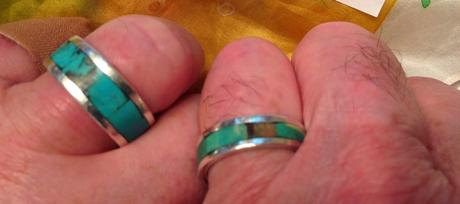
I don't want to badger you with postings on what's a holiday weekend for many of us. Steve and I have been, in fact, away visiting friends over the holiday weekend, and won't return home until tomorrow — hence my slowness about responding to your much-appreciated comments here in the past two days.
I do want, however, to make a short response to the good comments a number of you have posted in response to my previous two postings (here and here). Several of you make a good point about the Heather King blog posting to which the second of these links points.
I agree: it's engaging, thoughtful, and then, wham: all of a sudden, there they are, those two baffling declarations I highlight in my posting:
The religious left is all about "faux love." Two gay people "marry," that’s supposedly an increase of love.
There the sentences are, after all the nice preceding statements about love, and what am I to do with those declarations as a gay person? What am I to do with them as a gay Catholic? How should I engage them as a gay Catholic who, in fact, recently married?
Should I simply conclude that the love about which many Catholics can speak insightfully often has a major blind spot when it comes to me and others like me? Or do declarations like these sentences that suddenly appear like a baleful wham in King's essay call on all of us who are Catholic to ask ourselves whether something has gotten perhaps more than a little twisted in our hearts and minds when it comes to certain members of the human community, as we expound on what love means for us?
I've long since concluded the latter, and part of my point — a primary point — in discussing my encounter with fellow Catholics touting Heather King's essay in my Facebook feed yesterday is to suggest that you don't get to talk eloquently about love when you treat a discrete group within the human community in this eminently unloving way.
For daring to object to the appearance of a link to King's essay in my Facebook feed (an unsolicited link from someone who's not even my Facebook friend), I then got slapped upside the head with an ugly taunting comment about my connection to my husband, to the man I married on May 12 — a man to whom I'm only "married" in the mind of many Catholics citing Catholic teaching as their warrant for reaching this conclusion.
To the man for whom my love is "faux love," not true love.
That slap upside the head was delivered to me by someone studying pastoral ministry (!!) at a well-known Jesuit school of theology in California.
As the object of such rhetoric, I have to be honest about how I feel: I find it offensive in the extreme. I find it hurtful. I find it the opposite of loving.
I find that it radically — decisively — undermines the claim of those pushing such rhetoric to be talking about love at all.
I'm proposing for your consideration that something is royally screwed up in the minds and hearts of Catholics who buy into Catholic magisterial teaching about human sexuality, because that teaching is itself royally screwed up. It twists good people who buy into it into knots.
It produces a serious sickness in the Catholic soul, and that sickness is perhaps nowhere more in evidence than in how some members of the Catholic community feel they are entitled to talk about their brothers and sisters who are gay. As they claim to be all about love in their dealings with people whose very existence they've bracketed with scare quotes, as a Facebook friend of mine said in the discussion of my response to King's article about my Facebook page today . . . .

